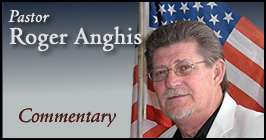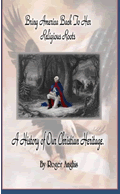POLITICAL SERMONS FROM PASTORS IN THE FOUNDING ERA
PART 49
By
Pastor Roger Anghis
August 17, 2014
NewsWithViews.com
A SERMON PREACHED BEFORE THE Honorable COUNCIL, AND THE HONORABLE House of Representatives, OF THE State of Massachusetts-Bay, IN New-England, AT Boston, May 27, 1778.
Being the Anniversary for the Election OF THE honorable COUNCIL. By PHILLIPS PAYSON, A. M. Pastor of a Church in Chelsea.
BUT JERURSALEM, WHICH IS ABOVE, IS FREE, WHICH IS THE MOTHER OF US ALL. SO THEN, BRETHREN WE ARE NOT CHILDREN OF THE BOND WOMAN, BUT OF THE FREE. — Gal. iv. 26, 31.
As Pastor Payson continues he stresses the importance of unity within the Colonies forming a stronger defense against the common enemy. But he also stresses the need for godly principles to be present and practiced diligently. "A spirit of union is certainly a most happy omen in a state, and, upon righteous principles, should be cultivated and improved with diligence. It greatly strengthens public measures, and gives them vigor and dispatch; so that but small states, when united, have done wonders in defending their liberties against powerful monarchs. Of this we have a memorable example in the little state of Athens, which destroyed the fleet of Xerxes, consisting of a thousand ships, and drove Darius with his army of three hundred thousand men out of Greece."[1] (Emphasis mine throughout)
He states again, as all the other pastors have stated, that it is to be godly men who hold office otherwise it will be to the detriment of the people as a whole. He also mentions that because of the effects of power on men that we should not allow a person to stay in a position of authority for long periods of time. "Ignorant and designing men should be kept from public offices in the state, as the former will be dupes to the ambitious, and the latter will be likely to prove the instruments of discord. Men, upon their first promotion, commonly act and speak with an air of meekness and diffidence, which however may consist with firmness and resolution. The practice of power is apt to dissipate these humble airs ; for this and other reasons it may generally be best not to continue persons a long time in places of honor and emolument."[2]
We have seen the results of this in Congress where a man holds a seat in the House or Senate for decades. This always is followed by years of cronyism, graft, and corruption on a massive scale. All of this has been examples of the need for term limits. We have to remember that our form of government is a representative government and to be truly a representative government we have to have a renewal of men and women in places of authority.
Payson describes the type of government that is being sought. He points to the fact that any power given by the people is necessarily limited. We do not see the willingness in today's government local, State or federal to be reined in. There has been a continual overreach of power in every administration federally as well as in the State ever since the Founding of this nation. Some of the attempts to overreach has been stopped but many have either been ignored or been so gradual that it has gone unnoticed. "The qualities of a good ruler may be estimated from the nature of a free government. Power being a delegation, and all delegated power being in its nature subordinate and limited, hence rulers are but trustees, and government a trust ; therefore fidelity is a prime qualification in a ruler; this, joined with good natural and acquired abilities, goes far to complete the character. Natural disposition that is benevolent and kind, embellished with the graceful modes of address, agreeably strike the mind, and hence, in preference to greater real abilities, will commonly carry the votes "[3]
Payson brings to the forefront again the main objective of the people that are in positions of authority. "So, in our searches for truth and knowledge, and in our labors for improvement, we should keep within the ken or compass of the human mind. The welfare of the public being the great object of the ruler's views, they ought, of consequence, to be discerningin the times— always awake and watchful to the public danger and defense. And in order that government may support a proper air of dignity, and command respect, the ruler should engage in public matters, and perform the duties of his office, with gravity and solemnity of spirit.
With wisdom he will deliberate upon public measures; and, tenacious of a well-formed purpose and design, he will pursue it with an inflexible stability. Political knowledge, a sense of honor, an open and generous mind, it is confessed, will direct and urge a ruler to actions and exertions beneficial to the state ; and if, added to these, he has a principle of religion and the fear of God, it will in the best manner fit him for the whole course of allotted duty.
The greatest restraints, the noblest motives, and the best supports arise from our holy religion. The pious ruler is by far the most likely to promote the public good. His example will have the most happy influence; his public devotions will not only be acts of worship and homage to God, but also of charity to men. Superior to base passions and little resentments, undismayed by danger, not awed by threatenings, he guides the helm in storm and tempest, and is ready, if called in providence, to sacrifice his life for himself to his God, he avoids the subtle arts of chicanery, which are productive of so much mischief in a state ; exercising a conscience void of offence, he has food to eat which the world knows not of, and in the hour of his death — that solemn period —has a hope and confidence in God, which is better than a thousand worlds."[4]
Payson's attention to a man's character who is in a position of authority defines the mindset of the Founding era concerning the quality of a person put in authority. This attention to character had been taught to all from an early age and was believed and practiced by the majority of the people, not just the Founders. Benjamin Rush, Signer of the Declaration of Independence; Surgeon General of the Continental Army; Ratifier of the Constitution; “Father of American Medicine”; Treasurer of the U.S. Mint; “Father of Public Schools under the Constitution” stated: "The Gospel of Jesus Christ prescribes the wisest rules for just conduct in every situation in life. Happy they who are enabled to obey them in all situations." John Adams stated: "The Gospel of Jesus Christ prescribes the wisest rules for just conduct in every situation in life. Happy they who are enabled to obey them in all situations." Charles Carroll stated: “Without morals a republic cannot subsist any length of time; they, therefore, who are decrying the Christian religion, whose morality is so sublime and pure (and) which insures to the good eternal happiness, are undermining the solid foundation of morals, the best security for the duration of free governments.” George Washington stated: “Without a humble imitation of the characteristics of the Divine Author of our blessed religion, we can never hope to be a happy nation.”
|
|
It was the character of a man that was of utmost importance to the Founders and they believed that that character needed to be grounded in the principles of the Christian religion that they embraced. It was not a requirement just for political positions, it was what they required from all men in all areas of life. This is a quality that we have let slip and no longer hold a man to. Hence the condition of today's political climate. A return to what made us great is what is needed. A return to God will be the only thing that will accomplish that. Even Benjamin Franklin, probably the least godly man of the Founders stated: “As to Jesus of Nazareth, my opinion of whom you particularly desire, I think the system of morals and His religion as He left them to us is the best the world ever saw or is likely to see.”[4]
Click here for part -----> 1, 2, 3, 4, 5, 6, 7, 8, 9, 10, 11, 12, 13, 14, 15, 16, 17, 18, 19, 20, 21, 22, 23, 24, 25, 26, 27, 28, 29, 30, 31, 32, 33, 34, 35, 36, 37, 38, 39, 40, 41, 42, 43, 44, 45, 46, 47, 48, 49, 50,
Footnotes:
1.
Pulpit of the American Revolution, John W. Thorton, The Federalist Papers
Project, (Gould and Lincoln, Boston), pp. 344-345.
2.
Pulpit of the American Revolution, John W. Thorton, The Federalist Papers
Project, (Gould and Lincoln, Boston), p.345.
3.
Pulpit of the American Revolution, John W. Thorton, The Federalist Papers
Project, (Gould and Lincoln, Boston), pp. 345-346.
4.
Benjamin Franklin, Works of Benjamin Franklin, John Bigelow, editor
(New York: G.P. Putnam’s Sons, 1904), p. 185, to Ezra Stiles,
March 9, 1790.
� 2014 Roger Anghis - All Rights Reserved
Pastor Roger Anghis is the Founder of RestoreFreeSpeech.org, an organization designed to draw attention to the need of returning free speech rights to churches that was restricted in 1954.
President of The Damascus Project, TheDamascusProject.org, which has a stated purpose of teaching pastors and lay people the need of the churches involvement in the political arena and to teach the historical role of Christianity in the politics of the United States. Married-37 years, 3 children, three grandchildren.
Web site: RestoreFreeSpeech.org
E-Mail: editor@restorefreespeech.org













 Share
This Article
Share
This Article






